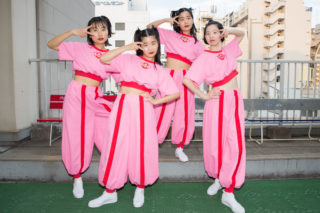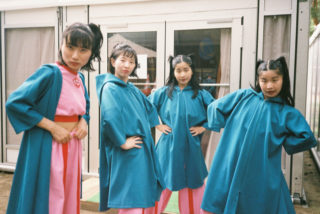CHAI – the Japanese group subverting the culture of Kawaii
“We are CHAI! Everything is different about us compared with other Japanese girl groups!"

“We are CHAI! Everything is different about us compared with other Japanese girl groups!"
I try to focus on the sentence in front of me. “Gyoza is so warm right? We want to be able to wrap around people like a Gyoza!” The further I read down the page the more confused and delighted I get. A flurry of correspondence with four women from Nagoya, Japan, unravels into love stories about dumplings, the meaning of ‘Kawaii’ and dancing on the furniture. Not quite what I expected when I first emailed CHAI in their studio on the other side of the world but this is a band that defy explanation.
“We are CHAI! Everything is different about us compared with other Japanese girl groups! We want to do everything that no one else has ever done!” Listening to their music its evident CHAI have made a decent head start on this mission. Their debut UK release, ‘PINK’, a mini-album with maxi-impact on Heavenly Recordings, should come accompanied with as many exclamation marks as their emails. That’s because ‘PINK’ is a musical yelp, an explosion of expression where colour is a language and iridescent barriers of sound are purpose-built for cliché to bounce off. CHAI’s record shreds Krautrock, punk and bizarre pop elements to make you sit up, stand up and jump up onto what you were sitting on in the first place. It’s a nerve-jangling ride that I happily admitted to them, left me exhausted. “That’s such a NICEEE reaction! We’re happy to hear that ‘PINK’ made you want to dance on the furniture and then take a long lie down! While listening to ‘PINK’ we recommend you have fun and enjoy yourself to the max! Even to the point where you get exhausted!”
Identical twins Mana and Kana combine with childhood classmates Yuuki and Yuna on rhythm section to create something quite unique. Sure, they’re a Japanese girl group, so nothing out of the ordinary, right? Although the ideology they preach is a real punch to the patriarchy in their home country. “You’ve got to be included in what is defined as ‘Kawaii’; everything outside of that is considered unattractive or ugly. Particularly in Japan.”
I discover Kawaii is a construct centuries in the making – Japanese aesthetics used to be refined and elegant, now they’re cute and neat. The cult of Kawaii’s origin lies as far back as the 17th century; well-proportioned miniature sculptures called Netsuke were built to serve practical functions. Cast forward 300 years to the 1970s and the cute is now permeating society. Teenage girls begin accessorising their handwriting with lyrical touches, so just as utilitarian objects were built to be pleasing to the eye, sentences are decorated and language built upon.
In the 1980s, pop culture became cute with idols such as Seiko Matsuda, whose mannerisms emphasised the helplessness and innocence of young girls, and of course everyone is familiar with Hello Kitty, an 80s invention from Japanese company Sanrio that’s become a global Kawaii brand. CHAI want to flip this rhetoric upside down. “That’s right,” they tell me, “the word ‘cute’, or ‘Kawaii’, has a set standard… it’s decided based on the good and bad of your appearance. In reality, it shouldn’t be that… the differences in everyone’s characteristics are OK! That’s the kind of message we want to put out.”
This desire to subvert expectations – to reinvent the concept of Kawaii – is the root of CHAI’s artistry, and judging by their emails, they’re pretty passionate about it: “The Kawaii we have and consider now has a very narrow definition. Everything other than what’s within that narrow range of Kawaii is considered ugly. For example, ‘you can’t have small eyes’, ‘your legs have to be skinny’, ‘your skin should be of a fairer or a whiter tone’… this image or standard of Kawaii is pretty clear. None of us CHAI members are in these categories to begin with but we really want to get out the message that everyone has their own characteristics and that is what makes you attractive! ‘That’s what makes you Kawaii,’ is what we want to say!”

It’s a powerful message that resonates worldwide, even if you’ve never grappled with the meaning of Kawaii. “Of course!” they say. “We base our lyrics on what we would like people to potentially say to us!” Whatever your age, gender or nationality, these empowering hyper animated lyrics reject the mundane and have an uncanny way of making you feel good about yourself. ‘Isn’t being boring weird,’ they repeat in ‘N.E.O’, their anthem to the extraordinary, with a tempo more techno than a regular pop song.
This foursome feel permanently plugged-in, with routers for stomachs. They’re a symptom of the Internet inside us and when they talk about the changing tide of modernity, you believe them. “In the future, we see Kawaii developing into something that there are no standards to, where we can express however we want to more freely.”
It’s a mature outlook and rather poignant when you realise that CHAI are four girls who met in school, a location where Kawaii is king and everything is scrutinised. They’re about as close as you get for a band – two of them are twins after all. “We don’t really put too much thought into being twins per say,” says Kana. “Our faces are exactly the same but our personalities are TOTALLY different! Mana is CHAI’s engine, considered the innocent one and point of energy! I am more of CHAI’s warrior, the calm one and cool. Part of CHAI’s making is the balance between us twins. Not only that, the coming together of four totally different people is what really made CHAI. That’s why it’s balanced! Even our strengths and weaknesses are different but we all get along well! You know twins fight all the time but we always become cool again. We get along.”
Not every song on ‘PINK’ is politically charged or challenges Japanese conformity; some are just plain old love songs about dumplings. “‘Horechatta’ is based on our love for gyoza [dumplings],” the tell me. “There’s a lot of love packed inside of a gyoza. We thought they originated from Hong Kong so we shot the video over there, but turns out it didn’t come from Hong Kong. I love Japanese dumplings!”
“All of us CHAI members love to eat!” they write to me in one email. “Eating and gaining weight is what makes us super happy! We all want to get bigger together, more powerful and healthy at the same time, while continuing to make more music!” I wonder if this is why there was a limited release on Burger Records in America earlier this year. “We didn’t decide on that! But! We all really love burgers! Even hot dogs and pizza!”
Now ‘PINK’ has a home on Heavenly Recordings, something these four friends can’t contain their excitement about. “We are SO stoked that ‘PINK’ will be released on Heavenly in the UK! So happy! We want to expand more and perform more live shows overseas! We want to win a Grammy! We are so happy that people in the UK will be able to listen to our music and we’re looking forward to their reactions to it.”
The record release sits alongside a UK tour with Superorganism, another band with a strong sense of self. “To be able to perform in the UK for the first time makes us super happy,” they say. “Soooo excited! We really love Superorganism, so being able to perform with artist’s like them, is super exciting. Superorganism is doing something that’s one of a kind. It’ll make you jealous, that’s how amazing their music is! Their music is one of a kind and yet still has that lived-in reliability and warm feel. You can tell from their music how well they get along right? It’s really pop-like and kind of Kawaii. So much respect for them! We’re excited! We want to go perform with them RIGHT NOW!”
I remind them that they’ll get to sample British cuisine too. “Of course we want to eat fish and chips!” they say. “Good food is one thing that the world shares in common, right? We can’t wait to go to the UK since we’ve never been there before! Oh! And we really want to ride that red double-decker bus they have in England! We are so happy that people in the UK will be able to listen to our music.”
Word is spreading; CHAI’s particular, progressive brand of Kawaii will soon be everywhere. “Yes, its message is ‘everyone’s complexes are their individuality.’ Show it! Love your complexes! Make whatever it is your trademark and make sure to SHOW IT OFF!”
Photos: Yoshio Nakaiso